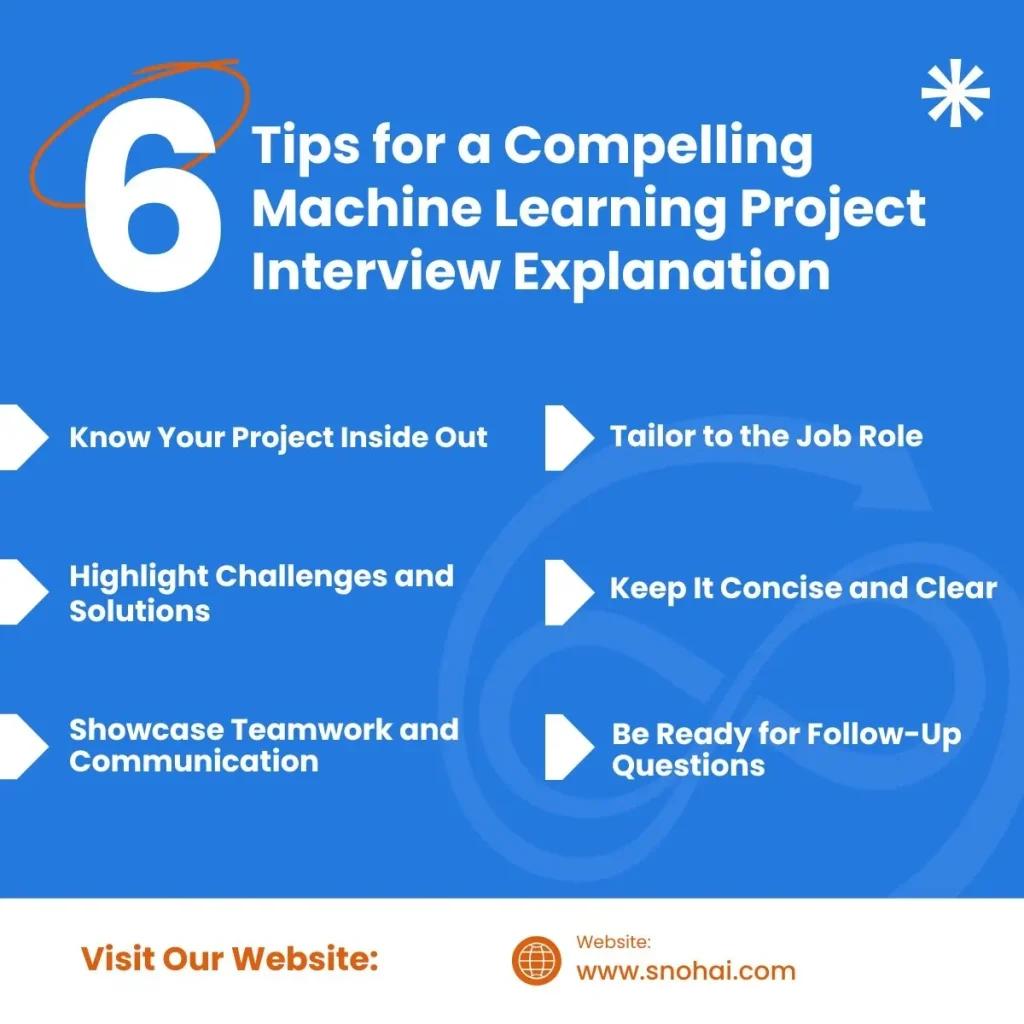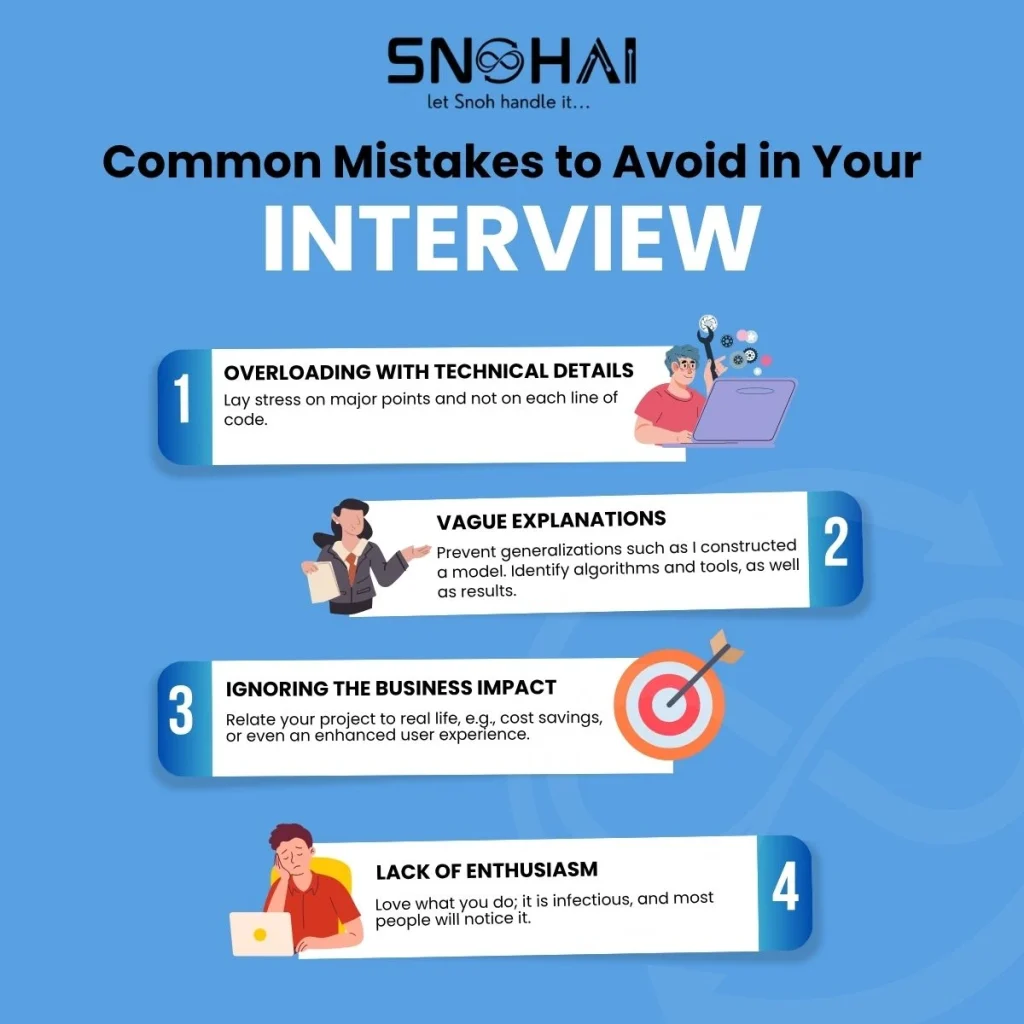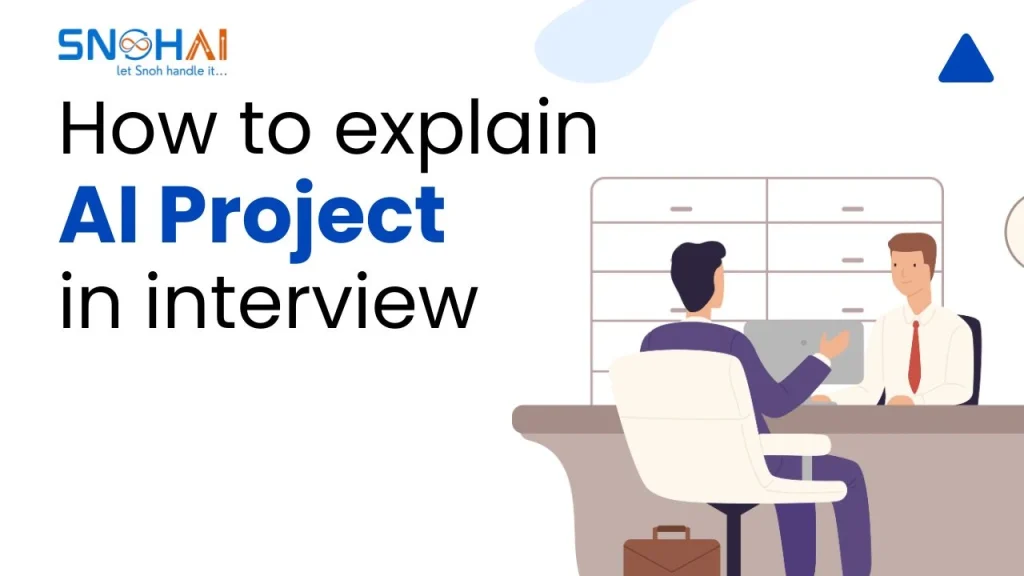An interview to become an AI or data positions specialist can be rather exciting and difficult, and it is when you need to talk about your college projects. These projects are usually core to your technical skills as they demonstrate how you can use theory in a real-life situation. Communication is paramount in the world of work, and how you explain college products in an interview is a key that may separate you. At Snohbricks Technology, we prefer these kinds of candidates. It is a professional guide on how to give an explanation of your AI project in interview contexts so that your machine learning or data science projects can shine.
Why College Projects Matter in AI/Data Role Interviews
A college degree in the field of AI and data science confirms your practical skills of working with tools, algorithms, and solving problems. They are actual proof of your expertise in such areas as machine learning, data analysis, or neural networks. These discussions allow interviewers in firms such as Snohbricks Technology to determine the depth of your technical knowledge, creativity, and how you can reduce elaborate concepts to simple conclusions. By mastering how to describe an ML project in an interview, you can convey not just what you did, but why it matters.
How to Explain AI Project in Interview Using the STAR Method
To effectively present your college projects, use a structured approach like the STAR method (Situation, Task, Action, Result). This ensures clarity and keeps your explanation concise. Here’s how to apply it:
- Situation: Write a brief set-up. What was the issue or the goal of your project? As an example, “My project was on customer churn prediction of an online service based on historical data.”
- Task: Describe job responsibility and objective. Did you preprocess the data, select a model, or deploy them? explain your input, more so when it was a group project.
- Action: Get into the technicalities. Write about all tools (e.g., Python, TensorFlow), algorithms (e.g., Random Forest, LSTM), and steps that you have completed. It is here that you discuss machine learning project interview questions by demonstrating the decision-making process.
- Result: Shed light upon the results. Did you succeed in getting good accuracy? Did it answer the problem, or did it give actionable insights? Quantify when possible, e.g,. The model increased the accuracy of prediction by 15%. This structure ensures your explanation is logical and engaging, helping interviewers follow your thought process.
Learn More: How to Use the STAR Method to Ace Your Next Job Interview
Tips for a Compelling Machine Learning Project Interview Explanation

- Know Your Project Inside Out
Reread the code and documentation and rethink the problems in your project before the interview. Have some technical machine learning project interview questions prepared, including ones like, What made you pick such an algorithm? Or, how did you deal with missing data? Knowledge of what you do will create confidence and credibility. - Tailor to the Job Role
Study what exactly the company does, i.e., it does predictive analytics, NLP, or computer vision, and adjust the relevance of your project. To take a specific example, when applying to Snohbricks Technology, which is focused on innovative AI solutions, show how your project brought an innovative solution to a real-life issue. Making your explanation of the AI project fit the interview demonstrates that you have prepared. - Highlight Challenges and Solutions
Interviewers enjoy listening to challenges that you have overcome. Did you have unbalanced datasets, or you had constraints due to computation? How did you overcome them, possibly through data balancing (e.g., SMOTE) or hyperparameter optimization? This shows analytical thinking, which is an essential part of AI/data. - Keep It Concise and Clear
Do not use a lot of jargon to explain. Minor tense to explain difficult things. As an example, rather than uttering We used a convolutional neural network, you can say We used a neural network to interpret images and identify patterns. Precise articulation of the way to explain an ML project in an interview opens up your work even to non-technical interviewers. - Showcase Teamwork and Communication
In case it was a group project, explain your role without ignoring the others. Note how you presented the results, possibly a graph or a talk. This demonstrates that you can be cross-functional, which is an important capability in AI/data jobs. - Be Ready for Follow-Up Questions
The interview questions about the machine learning project may include such questions as What would you do differently? How were you able to assess your model? Trade-offs are one area which should be practiced, ex, precision vs recall or interpretability vs a simpler model. This demonstrates flexibility and critical thinking.
Common Mistakes to Avoid

● Overloading with Technical Details: Lay stress on major points and not on each line of code.
● Vague Explanations: Prevent generalizations such as I constructed a model. Identify algorithms and tools, as well as results.
● Ignoring the Business Impact: Relate your project to real life, e.g., cost savings, or even an enhanced user experience.
● Lack of Enthusiasm: Love what you do; it is infectious, and most people will notice it.
Practicing Your Delivery
The only thing is practice to get a hang of how to explain what college projects one has done in an interview. Engage in mock interviewing with peers or other sites such as the career resources of Snohbricks Technology to help get the feel of real life. Record yourself to perfect the tone and pace. The more natural and confident your delivery will be.
Leveraging Your Portfolio
You can enhance your oral presentation with a good portfolio. Add a GitHub link or a short report in which you summarize your project. To clarify your explanation of the AI project during the interview, refer to certain artifacts, such as a visualization or a model architecture diagram. Make your portfolio available and professional to match the clarity and innovation at Snohbricks Technology.
Conclusion
Telling your college projects well in AI/data role interviews is rather a matter of clarity, relevance, and passion. That way, by giving a structured explanation and demonstrating the understanding of the role and preparing machine learning project interview questions, you can reveal your technical and communication skills. At Snohbricks Technology, we are eager to have candidates who are able to connect theory and practice, so use your projects to sell yourself. Preparation and practice will help you turn your college work into an interesting story that can win you the job.
FAQs
How do I handle technical questions about my project?
Review your code in your project and prepare to articulate your decisions effectively and efficiently, such as an algorithm to use or an initial preprocessing procedure.
What if my project was a group effort?
Specify what you do and contribute, and appreciate the work done by the team to demonstrate teamwork skills.
How can I make my project relevant to the job?
Study the interests of this company and point out points of your project that fit their interests or technologies.
What if my project didn’t have great results?
Talk about the lessons and how you overcome difficulties, how you solve a problem.
How do I prepare for unexpected questions?
Study different machine learning project interview questions and prepare to debate trade-offs or other solutions.

